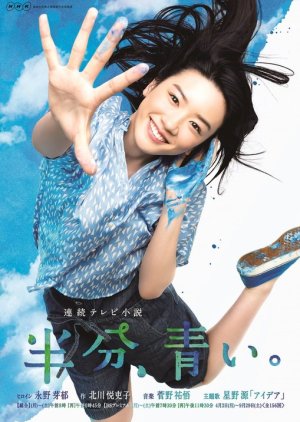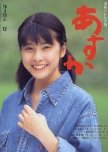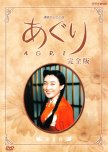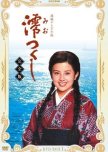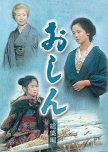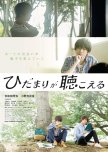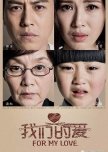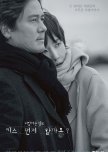
Hanbun, Aoi was the summer asadora in 2018, and tells the story of Suzume from birth through the age of 40. As a typical NHK asadora the production, cast and direction are all of the usual high quality. However, the show is an exemplar of bad top-down writing in which certain check-points have to be hit for the protagonist in the desired narrative, and as a result there are some unbelievably stupid plot points along the way. I think the series is meant to be a fabulous tale of a young woman overcoming some personal adversities to find the love and happiness that she was fated to find. The title "Half Blue" is meant to be interpreted as a "the glass is half-full" kind of optimism in the face of challenges, but, ultimately, the story pretty much continuously beats down the protagonist, ignores any of her achievements and acquisition of skills along the way, and reaches a markedly tepid finale (The marginally interesting thing they were working on goes into production and the preordained OTP finally hug. Yay?)
The first third of the story is reasonably interesting. Suzume loses the hearing in her left ear at 8 from an otherwise asymptomatic cases of the mumps. She is supported by her family and friends and adapts to her disability. Suzume is not particularly bright, but does have some talent at drawing and illustration and so she decides to pursue a dream of becoming a mangaka. She becomes one of three proteges of a very successful mangaka, and the characters throughout this section and the challenges they face as artists are all pretty interesting and fun.
The brief middle section middle section which is meant to transition the character from a working mangaka to a single mom is pretty much utter tripe. Events which normally would be signs of success are interpreted as disasters. Plot threads about finances are brought up and then blatantly ignored over a couple of large time jumps, and the marriage ends pretty much as it began: because the writer says so, Nothing in this section makes much sense.
The last half of the series is focused on Suzume becoming a maker where you might expect the skills she developed as a mangaka to come in handy and help her thrive. But, no. The story pretty much continues to beat her down, and we are left with a very mild will-they/won't-they plot that lurches over an arbitrary finish line slightly beyond the Tohoku earthquake.
The cast is good, however, and Nagano Mei capably carries the show, such as it is. The character cries fairly frequently and the actress seems to get there effortlessly. Suzume is a little blunt and a little oblivious, and Nagano's charm makes the character quite likable. Like most asadora there is a large ensemble cast surrounding her with an interesting range of characters with their own dreams and aspirations.
Top down writing is not necessarily bad. Sakamoto Yuji's 2016 Love That Makes You Cry (https://mydramalist.com/16024-love-that-makes-you-cry) covers much the same territory, planting the Tohoku quake in the exact middle of the series and ending on the OTP's first kiss. But even then, it's not his best work, and comes off as more of a writer's exercise than one of his more organic tales. In contrast, the blatant structuring of the story makes Hanbun, Aoi even less interesting because the predictable ending is predictable and the machinations to get the characters where the outline put them frequently seem arbitrary and contrived.
Was this review helpful to you?

Yes, I've patiently completed the drama and did slightly skipped a couple of scenes. Hehehe... Anyway, the drama tells a story of young girl named Suzume Nireno. She's a girl with big dreams and always chase for that dream despite of what others say. Despite not being to able to listen on one side of her ear, it didn't stopped her pursuing her dreams. This drama has such a sweet, funny and yet quite sad story to it. I would recommend it of course. It's really fast and you won't realize how fast you will be able to finish because it's only 15 minutes. I'm gonna have a bit of hard time to get over this drama and move to a new one but all ends well and that's all matter. Enjoy!
Was this review helpful to you?

This review may contain spoilers
Half Blue
This is only my third asadora. I chose "Hanbun, Aoi" because I was looking for something a little lighter than the previous one I watched. It definitely delivers as the drama is full of comedic, light-hearted moments that I loved. If you've seen the "Reply" series, "Hanbun, Aoi" reminded me of it in several aspects. However, it is an asadora and has plenty of really emotional moments, especially as you get to the end.Out of the three asadora dramas I've seen thus far, "Hanbun, Aoi" has the weakest story. It starts off a little slow with the childhood and adolescence weeks, but it's easy enough to push through these and they are important in the long run. Suzume (played by Mei Nagano) is the series heroine. As a child, she loses the hearing in her left ear. This will continue to effect throughout the entire series. "Hanbun, Aoi" picks up when Suzume finds her passion. Becoming a manga artist. These weeks were no doubt my favorite and not only because I'm a manga fanatic. The world of manga, however, is sadly a tough one. Suzume manages to make her debut, but eventually decides that she can go no further. Whether Suzume should've given up or not is up for debate, but I really enjoyed how the storyline was handled.
Now the next half of "Hanbun, Aoi" was completely unrecognizable from the first. I have to say that I went through a bit of shock. I'm going to address Suzume's love interest now. Ritsu (played by Takeru Satoh) was born on the same day as Suzume and has always been on her side until they parted ways. When they reunite, he proposes to Suzume but she mistakenly says "I can't". He marries someone else a few years later. For me, this was very frustrating and only gets worse if we're being honest. On top of that, Takeru is very underutilized as Ritsu and he only gets character development sporadically.
Suzume, depressed by missing her chance to marry Ritsu and giving up her dream, starts working at a 100-yen store. There she meets Ryoji (played by Shotaro Mamiya) and they decide to marry after only knowing each other for a week. It's cute in a way, but they both come off as extremely naive in relationships. Suzume decides to support Ryoji in his dream of becoming a director, but he decides to give it up after failing and then Suzume getting pregnant. They are a happy family until Ryoji decides to abandon him to pursue his dream again. I don't know what's worse: Your husband leaving you for another woman or leaving because you're in the way of his dreams. Yikes. Suzume returns home and enter Ritsu.
The story becomes somewhat frustrating at this point. Suzume seems to just jump from one thing to another. I wish the writers had decided on a second dream for her and stuck with it. And worse, she and Ritsu are back in each other's lives but... Ritsu is still married and seemingly doesn't want to leave her, despite their obvious problems. I'm not advocating giving up on your marriage so easily, but this was just another excuse for the writers to delay the main couple again. Another time-skip. Suzume is back in Tokyo for her daughter to take skating lessons. She's failing at being a start-up businesswoman. Ritsu returns from America and is finally divorced (his wife left him!). Suzume and Ritsu partner together on a start-up. Finally, after completing their first project, they decide to be together.
"Hanbun, Aoi" has one of the most frustrating main couples I've seen in a long time. It's unfortunate because I really like them together and I just wish that we had seen more of them. However, this is by no means a bad drama because of that. Most of the characters are really strong, including Suzume (though her career choices are a bit bizarre). I love her family and her friends. She has absolutely beautiful relationships with her mother, daughter, and best friends. This is definitely the highlight of this drama. "Hanbun, Aoi" translates to "half blue." I think it means something like looking on the bright side. Though bad things will happen to you, there will always be good times.
Was this review helpful to you?

This review may contain spoilers
I wasn't really planning to write a review, but I wasn't planning to watch this drama either so I'm good. 15min each episode isn't that much and I gave it a try.I firstly came here because of Nagano Mei and didn't check the entire cast, but ended up really happy to see Takeru Sato in there when I started watching it, I'll never get tired of seeing his face and hearing his voice.
Since the beginning watching it was a good fresh air in the middle of a hell year (if you're reading this after watching, the choice of words was intended) and not only the main heroine, but EVERYONE in the cast did a good job in this show. If you're expecting a bunch of plot-twist, hard drama and a deep writing show, avoid watching it, but instead if you want to, watch it with peace in mind.
I would pass 6 months only watching Yazaki Yusa playing Suzume and I'm longing to see her getting main role one day because I know she would play it well. And I didn't know I would love a support role so much like I loved Seino Nana playing Yuko and Shison Jun playing Bokute, they both had a lovely chemistry with the main actress and everytime I saw them on screen I felt so happy that I didn't hold myself from crying so much with the ending, I think that kind of event will endure in my head a little longer than I imagined. I have to say, I wasn't expecting how they life would change and how they never distancied from each other even living far away.
Seeing Suzume showing interests in many things while growing up and never giving up of running after stuff that make her satisfied AND being an adult at the same time kinda make you fell a little bit relieved of passing the age of 20 years old and not having a stable life. At the beginning I thought she didn't have a major character development after reaching 24 years old, but then it changed after she had a daughter and had to face a married life while being poor with a kid. The entire time I was cheering for Ryoji to divorce her because I didn't like his behavior toward his family, and because (of course) I was expecting Takeru Sato to take over of the screen again. Have I said how I loved his character here? Giving perfection as usual. But, other than being biased I only cheered and liked Ritsu at the very ending for the same reason I liked Suzume being portrayed as a dreamer despite her circunstances. Getting older in these point of view isn't that bad.
If I would watch it again? Not so soon, perhaps never again because it gave me the kind of feeling of seeing them growing up and getting older that maybe watching it again can ruin it.
Was this review helpful to you?

This review may contain spoilers
Era perfecta al inicio. ?
Una historia muy bonita cuando empieza por mostrarnos a los protagonistas de pequeños y su linda y tierna amistad hasta la secundaria.Las travesuras que hacen juntos y además la forma de apoyarse era algo que me gustaba mucho de esta historia.
Lamentablemente, perdió todo el encanto cuando el protagonista tiene novia y está novia lo aleja de sus amigos y de la protagonista.
Desde ahí TODO va de mal en peor.
Ambos pierden tiempo muy valioso por no ser lo suficientemente honestos con sus sentimientos y eso no es algo agradable de ver.
Solo hice corajes conforme se acercaba el final.
Algo que definitivamente no me agrado de esta historia fue que cuando ellos vuelven a reencontrarse , ella ya estando divorciada y con una hija, él CASADO y con un hijo ; la familia y amigos los apoyaban para que estuvieran juntos aunque él tuviera familia.
Así que la verdad ... recomendaría ver solo los primeros capítulos, para después dejar de verla he imaginarse el resto de la historia.
Was this review helpful to you?

La meilleure moité
/!\ Omoïde Review/!\Ma première critique basée uniquement sur des souvenirs de visionnage sera Hanbun Aoï, vu il y a 2 ans de cela, mais qui me parait totalement indispensable à voir encore aujourd'hui pour tout fan de Japon qui se respecte. 98ième Asadora de la NHK, sortie en 2018 et s'étalant comme presque tous les autres sur une durée de diffusion semestriel, il m'a marqué pour différentes bonnes raisons :
Déjà, c'était mon premier Asadora et il m'a fait tomber amoureux du concept de suivre une famille ou un personnage sur une bonne partie de sa vie. 15 min par jour et cela pendant 6 mois. Grace au décalage horaire, la diffusion à 7h00 du matin au Japon s'est transformée pour moi en messe de minuit, chaque soir en France, pendant cette longue période. Ma petite tisane avant de m'endormir en quelque sorte. Effectivement, 156 épisodes peuvent parfois tirer en longueur et faire somnoler. Mais Hanbun aoi fait parti des meilleurs et on a moins l'occasion de s'ennuyer que d'autre Asadora malgré tout.
Venir à suivre un Asadora, n'est pas qu'une question de temps. Il faut accrocher au sujet et aux personnages. On arrive donc au deux autres raisons qui mon poussé à suivre aussi longtemps la série. L'actrice principale, Nagano Mei que j'ai toujours considéré comme la Sophie Marceau japonaise, porte la série sur ses frêles épaules. Passant de l'adolescence à sa jeune vie d'adulte, puis à la vie désabusée d'une trentenaire jusqu'à sa quarantaine, d'après mes souvenirs. Souvent dans ses séries, certaines périodes de la vie peuvent paraître fausses tant le physique, le maquillage ou la voix ne s'adaptent pas à l'age. Mais Mei, grâce à ses excellents talents de comédiennes, réussit à nous faire croire qu'elle à 40 ans à la fin de la série.
Le dernier point qui m'a fait accrocher et qui était une véritable bonne surprise pour l'otak que je suis, c'est le sujet traité en profondeur sur un très grand nombre d'épisodes. La vie d'un mangaka dans les années 80-90, l'age d'or s'il en est. Toujours très réaliste et bien documenté comme seuls les Japonais savent traiter un thème dans une série, on apprécie de voir comment Susume (Nagano Mei) est prise sous l'aile de Akikaze sensei, son mentor sur le long chemin de la sérialisation.
Si vous n'êtes pas demandeur de détail de la vie de mangaka vous apprécierez tout de même de suivre le quotidien de nombreux japonais de l'ère Showa puis Heisei, de surcroît débutant durant l'exposition d'Osaka. Quitter sa campagne pour la ville, les petits jobs puis réaliser son rêve, les désenchantements de la vie d'adulte, les remises en questions, le retour vers les vraies valeurs, après les lumières de la ville, pour terminer la série sur le séisme de 2010 et ses conséquences dramatiques qui vous toucheront à coup sûr.
Une galerie de personnages inspirés de la vie réelle (mangaka, réalisateur, inventeur, etc ...) et des acteurs de premier rang même pour les guests, comme toujours dans les Asadoras, rajoute encorede l'excellence à l'excellence.
La première partie jouée par la petite Yazaki Yusa, retraçant l'enfance de Susume et son handicap, reste une des plus touchantes, mais Mei par son regard et sa moue inimitables, arrive également à nous fendre le coeur régulièrement. On ne passera quand même pas son temps à pleurer sur le sort du couple impossible Susume/Ritsu, car l'écriture joue régulièrement entre humour et sensibilité. Et il faut bien dire que Mei est quand même très forte pour nous faire rire aussi.
La BO est excellente au point ou j'ai cherché longtemps à me la procurer et je me la réécoute encore souvent 2 ans après.
Pour conclure, si vous avez vécu votre jeunesse de geek dans les années 70-80-90, si le Japon de ses années et pas seulement dans les mangas vous a passionné, si vous êtes toujours amoureux de votre copain d'enfance, ou si vous aimez dessiner sur les vitres (générique d'enfer, comme souvent dans les Asadoras) cette série est pour vous. Et comme c'est japonais on sait que nos deux héros ne finiront pas forcément ensembles. Le suspense reste donc entier jusqu'à la fin, contrairement à Aozora, où je peine encore à regarder les 30 derniers épisodes et pourtant j'adore Hirose Suzu et l'animation. Parfois la magie disparait dans un ciel seulement à moitié bleu.
Omoïde Review: critique basée uniquement sur des vieux souvenirs, car plusieurs mois, voir plusieurs années se sont écoulés depuis mon dernier visionnage de la série. Désolé, donc pour les éventuelles erreurs ou oublis. N'hésitez pas à me corriger.
Was this review helpful to you?

